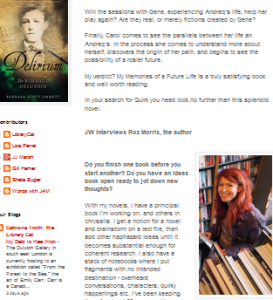 You remember I posted recently about authors collaborating? Well, I wouldn’t advise you to do anything I wouldn’t try myself.
You remember I posted recently about authors collaborating? Well, I wouldn’t advise you to do anything I wouldn’t try myself.
If you know me – and some of my friends – on Facebook, you might have seen some coy posts about how we’ll be revealing a big secret project.
Well here it is.
Seven writers of quality indie fiction are releasing an ebook collection called Outside the Box: Women Writing Women.
We’ve each of us proved our worth with awards, fellowships, teaching posts and commercial success. We’ve all self-published to keep our hard-earned independence and our artistic identity. Now we are teaming up to create an ebook box set of novels that feature strong, idiosyncratic female protagonists. And it will be available for just a brief period – from February to May 2015.
Power in a group
Now here’s where we can explore the power of the group. We’ve already been interviewed by The Guardian books pages, Books + Publishing (the Australian counterpart of Publisher’s Weekly) and have interest from the arts programmes of BBC Radio 4. If any of us had approached them on our own, we probably wouldn’t have got even a reply. But together?
We hope there’s more to come. Much more. These last few months we’ve been working behind the scenes, making contacts, sending emails. Certainly I’ll have a lot of learning to share about pre-launch campaigns. I am learning loads from these guys. (I should say ‘women’, but you know what I mean.)
So what do we hope to achieve?
To hit some charts, obviously. To reach readers who are hungry for strong literary fiction beyond the bounds of traditional genre tropes.
We also want to prove that fine, original authors are self-publishing as a mark of independence and integrity, and doing work of value and quality.
You might ask: is that still necessary? Does anyone still consider self-publishing to be ‘vanity’ or second rate? They clearly do, because this is one of the issues we’ve been asked about most frequently. And we have all encountered attitudes in the books world that demonstrate we are regarded as inferior. Try joining a professional body, applying for a grant or entering an award, or requesting a review. (Happily, we are already changing minds. Book bloggers who are wary of self-published books have welcomed us.)
Who are we?
Our coalition is:
Me, obviously (more than 4 million books sold as a ghostwriter, creative writing coach for The Guardian, literary author, editor);
Orna Ross, founder of the Alliance of Independent Authors, named one of the 100 Most Influential People in Publishing by The Bookseller;
Joni Rodgers, author/ghostwriter of multiple NYT bestsellers, short-listed for Barnes & Noble Discover Award;
Kathleen Jones, widely published Royal Literary Fund Fellow and frequent BBC contributor;
Jane Davis, winner of the Daily Mail First Novel Award hailed by The Bookseller as “One to Watch”;
Carol Cooper, physician, medical journalist, and winner of the 2013 BMA Book Award;
Jessica Bell, publishing editor of Vine Leaves Literary Journal and author of the bestselling Writing in a Nutshell series.
You’ll also know them all from The Undercover Soundtrack, except for Jane who doesn’t use music in her creative process. (But maybe we can change that!) Find our ‘who are we’ page here. And yes, you can see we dressed up for the occasion.

How much?
The collection is priced at USD$9.99 GBP7.99 – yes, that’s not throwaway pricing, but at roughly £1.15 per book it’s still a bargain. The box set (or e-anthology, if the word ‘box’ raises your hackles) will be available for just 90 days from February 20, though pre-orders have just opened now. Right this minute.
Out and about
We’ve got a host of blog appearances planned. We’ll be sharing plenty of information about the hows and wherefores, the triumphs and pitfalls. We’ll also be talking about our publishing journeys, our inspirations, our methods. And our work – our unconventional characters and their relationships, our themes and topics like body image culture, abortion, prostitution, euthanasia, domestic abuse, same-sex marriage, bereavement, psychological recovery and rogue healers.
If you have a blog and your readership would be interested in us, we’d love to be mentioned – or interviewed if that’s what you normally do. If you want to tweet about it and like lists of pre-prepared tweets, find them here. And if you post a review, fill in the form on this link and we’ll send you a digital swag bag that includes a free book plus lovely links, delicious downloads and some playful surprises.
Our hopes
If nothing else, we hope to bust some barriers in 2015. We want to prove that indie publishing is a positive choice for writers of quality, to show that writers can make good publishing decisions and lead the creative process. And if you’re happy with traditional publishing, we hope to add more power to your arm, by demonstrating that authors should be included in business and promotion decisions, treated as partners and offered fair deals.
It’s going to be exciting. Check us out at www.womenwritewomen.com.
7 unforgettable books by award-winning #WomenInLiterature. Only $9.99! Avail. Only 90 days! http://goo.gl/D1fyqW #WomenWritingWomen

 Does your plot have enough going on? I see a lot of manuscripts where the story seems to lack momentum, or the characters are spinning their wheels doing not very much of anything. But the funny thing is, the writer isn’t short of ideas. They’ve simply not realised where they are hiding.
Does your plot have enough going on? I see a lot of manuscripts where the story seems to lack momentum, or the characters are spinning their wheels doing not very much of anything. But the funny thing is, the writer isn’t short of ideas. They’ve simply not realised where they are hiding.















